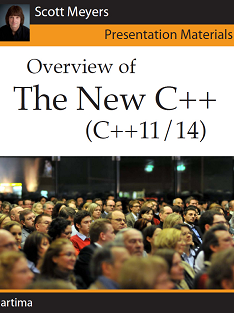Quick Q: Can I use a const std::regex from two threads without synchronization? -- StackOverflow
Quick A: See GotW #6a. The answer is the same for any object, not just regex.
Concurrently using std::regex, defined behaviour?
[...] I can't find anything which states whether using a
const std::regexconcurrently results in undefined behaviour or not. As far as I can tell, no edits are being made to theregexobject so no undefined behaviour should be induced by using it concurrently?Thanks in advance!

 Recently at Dr. Dobb's:
Recently at Dr. Dobb's: C++14 is still very much a draft -- it only became feature-complete in April and is now in its primary comment ballot. But interest in this new standard is high, with a restarted
C++14 is still very much a draft -- it only became feature-complete in April and is now in its primary comment ballot. But interest in this new standard is high, with a restarted  The Visual C++ Team Blog has been publishing an article series about optimizations that C++ compilers perform for you under the covers to make your code more efficient. This short nugget answers a question people sometimes ask: "What's constant folding, and why do I care?"
The Visual C++ Team Blog has been publishing an article series about optimizations that C++ compilers perform for you under the covers to make your code more efficient. This short nugget answers a question people sometimes ask: "What's constant folding, and why do I care?"